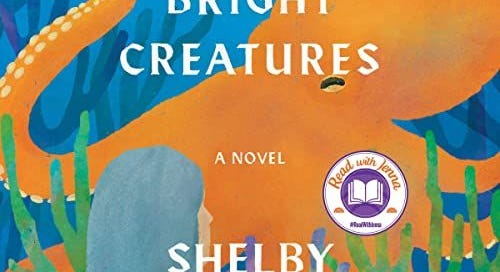I don't usually read literary fiction. I think of it is boring stories about boring people, but sometimes a quiet novel sneaks up on you and leaves you teary-eyed and touched. Remarkably Bright Creatures is exactly that kind of story. One that’s a gentle, an emotionally resonant debut about grief, healing, found family with a cast of remarkably bright creatures.
The story is clean and accessible, structured straightforward, and the clues especially surrounding the main character’s son Eric are easy to follow. I wanted to figure things out just before the characters did, not because I was outsmarting them, but because the author trusted the reader to put the pieces together at the right time. And that’s a rare and satisfying kind of narrative generosity.
Tova is a great main character used to convey grief, heritage, friendship, and the experience of aging. This last point, I found most interesting. One of her friends who is also elderly moves in with her younger family with the expectation that they'll take care of her in the last chapter of her life. For Tove's last chapter, she doesn't have anyone to take care of her no husband, no children, nobody. It made me think about how we treat elderly in the United States specifically. How people in the US have internalized independence we've done away with our village.
Hyper-individualism.
But even that doesn’t fully capture it. Pair that mindset with the rising number of childless adults in the US and you’ve got a perfect recipe for Tova’s situation becoming more and more common.
Another thing that struck me was how, when Tova’s friends first find out she’s moving, their immediate concern is her things. What will she do with them? Where will they go? I have a hard time with the Boomer generation’s fixation on stuff. I understand it sure. The objects in their homes often carry real sentimental weight. They may hoard handmade furniture crafted by a great-grandfather, but they don’t always pass down the story behind it. They just expect their children or grandchildren to take it, value it, and care for it—without passing on the reason why it matters.
And here we are, millennials and Gen Z, often without permanent homes ourselves. We move from apartment to apartment. You might need a coffee table in one place, not in the next, and then may need to buy one again after that. There’s no stable place to keep heirlooms, no guaranteed space to settle into. So we buy fast furniture, give things away when we move, donate what doesn’t fit the next layout. It’s not that we don’t care about history, it’s that we haven’t been given the space or the stories that make it possible to carry it forward.
In contrast to Tova is Cameron, a rootless 30-something bristling with questions he doesn’t even know how to ask. I found him highly unlikeable for most of the novel, making excuses for his own bad behaviors. Somehow everyone loves him. I found this very unrealistic. When he meets Avery he is dirty and smells like urine yet she strikes up a conversation and gives him her number. The author went to great lengths to make sure everyone liked and helped him, which didn’t feel real.
And then there’s Marcellus the octopus whose chapters are a masterclass in whimsy with a surprising depth. If you’re skeptical about an anthropomorphized sea creature, don’t be. Marcellus is cynical and oddly compassionate. His perspective offers both levity, wisdom and a lot of side eye.
I really loved the narration choice for Marcellus. If this is a book you’re going to pick up, do so with an audiobook! You won’t regret it.
I liked this story a lot. It has heavy topics of loss and grief that made me wonder if I could handle it, but its about that grief and the small moments of connection that make life worth returning to. Because healing doesn’t always come in grand gestures. Sometimes, it arrives in the form of two house keys, a full set of dala horses, a crappy camper van, a band t-shirt, a stray cat, or a class ring.





This is one of my favorite books. As you suggest, Audiobook is the way to go, simply to receive all of Marcellus and his glory. I have often wondered if the book would capture my heart the same way if I read so when preparing for book club this week I decided to pick up the paperback and read. I can hear Marcellus's voice in my head during his chapters but I can alter Cameron to make him less unlikeable. On this second read, I am able to better understand the charming part of him, which was impossible the first time with the whiney voice of a 16 year-old in a 30 year-old's timeline.
I enjoyed reading your review and am excited to talk about this lovey book more at my community book club on Monday.